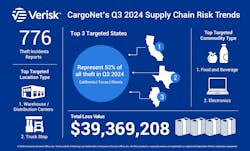This is part of FleetOwner's Fleets Explained, a Trucking 101 series to break down aspects of the trucking and fleet management industries. You can read more from the series, launched in May 2024, at fleetowner.com/fleets-explained. To submit topic ideas, clarifications, and corrections, email [email protected].
Thieves have preyed on cargo transporters long before trucks became the most popular and efficient way to move freight throughout the U.S. As trucking has become more sophisticated, so has cargo theft. One of the best ways for fleets to combat this crime is to better understand it.
Cargo theft is when thieves steal cargo from a shipment via plane, train, or—of course—commercial vehicles. Throughout 2024, cargo theft has only increased as a problem for the trucking industry. This article will look at the different kinds of cargo theft, what cargo is currently being stolen, when and where cargo theft occurs, prevention strategies, and what to do when cargo theft does occur.
What are the types of cargo theft?
According to Travelers, there are two main kinds of cargo theft: straight and strategic. Straight cargo theft is when thieves physically steal cargo from a shipment. Strategic cargo theft involves deception; when thieves trick shippers, brokers, or carriers into handing over the cargo. These are the two cargo theft categories that most other forms of cargo theft fit into. Here’s a closer look at the subcategories of straight and strategic cargo theft:
- Straight cargo theft:
- Burglary: Thieves may break into a trailer and steal some or all of its cargo while a truck driver is stopped along their route.
- Coerced stops: According to Amarok, thieves sometimes trick a truck driver into pulling over and then rob the driver and their truck. Thieves accomplish this by signaling to a driver that something may be wrong with their truck.
- Strategic cargo theft:
- Identity theft: According to Truckstop, thieves will use phishing and other online schemes to access a registered truck driver’s identity, which they then use to steal cargo.
- Motor carrier number manipulation: Motor carrier number manipulation occurs when motor carrier numbers are sold to cargo thieves who use the numbers to steal loads.
- Fictitious pickup: According to Amarok, fictitious pickups occur when a thief impersonates a driver who is authorized to pick up cargo
- Double brokering: According to Truckstop, double brokering is the transfer of a load from one freight broker to another without the shipper’s knowledge or consent.
The industry has seen a rise in strategic cargo theft over straight cargo theft. According to Scott Cornell, transportation lead and crime and theft specialist at Travelers, this is likely because strategic cargo theft is less risky for thieves than straight cargo theft since it doesn’t require the thieves to be physically present while stealing a load.
See also: What to do after a cargo theft incident
What cargo is being stolen?
What cargo thieves focus on stealing varies. According to Cornell in a past FleetOwner article, the economy drives what commodities are targeted for cargo theft; however, food and beverages are always targets because they’re consumable. CargoNet’s 2024 Third Quarter Supply Chain Risk Trends Analysis shows that the latter claim is still true today, as the most targeted commodity is food and beverages, followed only by electronics.
According to Amarok, other commonly targeted commodities are alcohol and tobacco. Amarok claims thieves target goods in high demand, making it easier to get rid of the cargo after it’s stolen.
When and where does cargo theft occur?
According to CargoNet’s most recent data, cargo theft is most likely to occur at distribution centers. The second most likely location is at truckstops.
More specifically, areas that see increased cargo theft include Southern California, Texas, Florida, Georgia, Memphis, and Chicago, according to Cornell. But this doesn’t mean other areas are safe from cargo theft.
According to Amarok, the peak season for cargo theft is from Labor Day through Christmas, because the shipping of goods increases before the holiday season.
See also: Cargo theft trends: Motor carrier number manipulation is on the rise
How can you prevent cargo theft?
As thieves become more sophisticated in their methods, cargo theft prevention isn’t easy or foolproof. But there are strategies fleets can take to prevent cargo theft, with knowledge and awareness being the most important tools of prevention.
- Locks: To prevent straight cargo theft, fleets can use hard locking devices and rear door locks on their trucks.
- Asset trackers: Tracking devices can help fleets locate trucks, cargo, trailers, and more.
- Established relationships: While not foolproof, it’s generally safer to work with drivers, brokers, shippers, etc., that you’ve worked with previously and trust. When you do need to work with someone new, it’s important to vet them thoroughly to ensure they are who they say they are.
- Communication: Communication within a fleet is vitally important. The scenario where a bad actor gains access to a driver’s phone number and calls them with directions to take the cargo to another facility can easily be resolved with the driver calling their dispatcher or the original broker who facilitated the load.
- Education: Fleets need to stay current on cargo theft trends. Everyone from executives to drivers need to know what to be on the lookout for.
- Plan: According to Cornell, it’s essential to have good processes and procedures in place regarding cargo theft. You don’t want to have to figure out how to handle cargo theft after it happens; you should already know exactly what steps must be taken.
- Prevention culture: Cargo theft prevention can’t be the responsibility of one person or just part of the industry. Given how sophisticated cargo thieves have become, a whole industry approach is needed to stop them, similar to how fleets tout having “safety cultures,” prevention cultures are needed as well.
This isn’t an exhaustive list, but these are some of the techniques that can be used to prevent cargo theft.
What do you do when cargo theft happens?
But no matter how proactive you are in prevention strategies, cargo theft can still happen. After a case of cargo theft, it’s important to notify law enforcement. Unfortunately, communication with law enforcement can be tricky for fleets due to miscommunication and misunderstanding. Here are some tips from Keith Lewis, CargoNet’s VP of operation, during a TCA webinar on how to better communicate with law enforcement so they can investigate cargo theft more efficiently:
- Find the right jurisdiction. When cargo theft occurs, every second counts. According to Lewis, it’s more time-effective to research the correct jurisdiction and contact them rather than just calling 911 immediately. This ensures you talk to the right person first. In the webinar, Lewis said to contact law enforcement both in the area where the cargo is stolen and where the cargo is supposed to go.
- Choose your words carefully. Don’t use industry jargon when reporting cargo theft. Lewis recommends researching the correct penal code for the state and using the same language when reporting to law enforcement. That way, there’s no confusion over what crime has occurred.
- Get a case number. According to Lewis, you can’t file an insurance claim without a case number. A case number also allows you to escalate your case to a detective if necessary. If law enforcement insists your case is a civil matter and refuses to give you a case number, Lewis recommends getting a computer-assisted dispatch number instead.
About the Author

Jenna Hume
Digital Editor
Digital Content Specialist Jenna Hume joined FleetOwner in November 2023 and previously worked as a writer in the gaming industry. She has a Bachelor of Fine Arts degree in creative writing from Truman State University and a master of Fine Arts degree in writing from Lindenwood University. She is currently based in Missouri.

